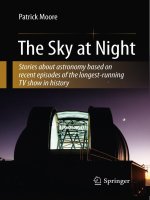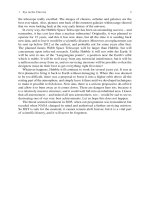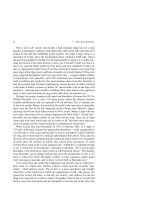Day and Night Sky
Bạn đang xem bản rút gọn của tài liệu. Xem và tải ngay bản đầy đủ của tài liệu tại đây (1.64 MB, 10 trang )
by Rose Murray
Scott Foresman Science 1.11
Genre Comprehension Skill Text Features Science Content
Nonfi ction Important Details • Captions
• Glossary
Day and Night Sky
ISBN 0-328-13763-4
ì<(sk$m)=bdhgdd< +^-Ä-U-Ä-U
Space and Technology
13763_CVR_FSD Cover113763_CVR_FSD Cover1 5/10/05 4:06:05 PM5/10/05 4:06:05 PM
by Rose Murray
Scott Foresman Science 1.11
Genre Comprehension Skill Text Features Science Content
Nonfi ction Important Details • Captions
• Glossary
Day and Night Sky
ISBN 0-328-13763-4
ì<(sk$m)=bdhgdd< +^-Ä-U-Ä-U
Space and Technology
13763_CVR_FSD Cover113763_CVR_FSD Cover1 5/10/05 4:06:05 PM5/10/05 4:06:05 PM
Vocabulary
Moon
planet
rotation
star
Sun
telescope
What did you learn?
1. What do living things need from the Sun?
2. What movement of Earth makes day and
night?
3.
Many objects in the sky
look small but they are not small. They are
big. Write to explain this. Use words from
the book as you write.
4.
Important Details What words
can you use to describe the Moon?
Illustrations: 6 Hank Dawson
Photographs: Every effort has been made to secure permission and provide appropriate credit
for photographic material. The publisher deeply regrets any omission and pledges to correct errors
called to its attention in subsequent editions. Unless otherwise acknowledged, all photographs are the
property of Scott Foresman, a division of Pearson Education. Photo locators denoted as follows:
Top (T), Center (C), Bottom (B), Left (L), Right (R) Background (Bkgd)
Opener: ©Dale C. Spartas/Corbis; Title Page: ©Jet Propulsion Laboratory/NASA; 2 ©Dale C.
Spartas/Corbis; 4 NASA; 5 (B) ©John Henley/Corbis, (C) ©Richard Glover/Corbis; 7 (C) ©Royalty-
Free/Corbis, (B) ©Tibor Bognár/Corbis; 8 ©Roger Ressmeyer/Corbis; 9 ©Jerry Lodriguss/Photo
Researchers, Inc.; 10 ©DK Images; 11 ©Roger Ressmeyer/Corbis; 12 ©Jet Propulsion Laboratory/
NASA; 13 ©Johnson Space Center/NASA; 14 (CL, CCL, CCR) ©Dennis di Cicco/Corbis, (CR) ©Jeff
Vanuga/Corbis; 15 ©Stone/Getty Images
ISBN: 0-328-13763-4
Copyright © Pearson Education, Inc.
All Rights Reserved. Printed in the United States of America. This publication is
protected by Copyright and permission should be obtained from the publisher
prior to any prohibited reproduction, storage in a retrieval system, or transmission
in any form by any means, electronic, mechanical, photocopying, recording, or
likewise. For information regarding permissions, write to: Permissions Department,
Scott Foresman, 1900 East Lake Avenue, Glenview, Illinois 60025.
3 4 5 6 7 8 9 10 V010 13 12 11 10 09 08 07 06 05
13763_CVR_FSD 213763_CVR_FSD 2 5/10/05 4:06:36 PM5/10/05 4:06:36 PM
Day and Night Sky
by Rose Murray
13763_01-16_FSD 113763_01-16_FSD 1 5/10/05 4:29:53 PM5/10/05 4:29:53 PM
What is in the day sky?
The Sun is a big ball of hot gas.
Light from the Sun warms Earth.
The Sun makes the day bright.
What can you see in the day sky?
2
13763_01-16_FSD 213763_01-16_FSD 2 5/10/05 4:29:58 PM5/10/05 4:29:58 PM
You may see clouds.
You may see the Moon too.
You can see the Moon more at night.
3
13763_01-16_FSD 313763_01-16_FSD 3 5/10/05 4:30:06 PM5/10/05 4:30:06 PM
The Bright Sun
The Sun lights Earth.
This light keeps Earth warm.
Living things need this light.
4
13763_01-16_FSD 413763_01-16_FSD 4 5/10/05 4:30:10 PM5/10/05 4:30:10 PM
5
The Sun is bigger than Earth.
It looks small.
It is far away.
It seems to move across the sky.
The Sun is above
you at noon.
The Sun is low in the
sky early in the day.
13763_01-16_FSD 513763_01-16_FSD 5 5/10/05 4:30:21 PM5/10/05 4:30:21 PM
6
What causes day
and night?
Earth is always moving.
Earth turns around and around.
This is called rotation.
Earth makes one rotation each day.
13763_01-16_FSD 613763_01-16_FSD 6 5/10/05 4:30:36 PM5/10/05 4:30:36 PM
Part of Earth faces the Sun.
Then it is day.
Part of Earth faces away from
the Sun.
Then it is night.
Rotation makes day and night.
7
13763_01-16_FSD 713763_01-16_FSD 7 5/10/05 4:30:46 PM5/10/05 4:30:46 PM
8
What is in the night sky?
Stars are in the sky.
A star is a big ball of hot gas.
Stars give off light.
Stars seem to move across the sky.
13763_01-16_FSD 813763_01-16_FSD 8 5/10/05 4:30:53 PM5/10/05 4:30:53 PM
Earth is a planet.
Nine planets move around the Sun.
Planets do not give off light.
9
13763_01-16_FSD 913763_01-16_FSD 9 5/10/05 4:31:26 PM5/10/05 4:31:26 PM
10
Most planets are hard to see.
You can use a telescope.
A telescope makes things that are
far away look closer.
13763_01-16_FSD 1013763_01-16_FSD 10 5/10/05 4:31:44 PM5/10/05 4:31:44 PM
Stars look small.
They are far away.
The Sun is the closest star to Earth.
11
13763_01-16_FSD 1113763_01-16_FSD 11 5/10/05 4:31:48 PM5/10/05 4:31:48 PM
12
The Moon at Night
The Moon moves around Earth.
The Moon is round.
The Moon looks small.
It is far away.
13763_01-16_FSD 1213763_01-16_FSD 12 5/10/05 4:31:55 PM5/10/05 4:31:55 PM
The Moon is not like Earth.
It has no air.
It has no living things.
13
13763_01-16_FSD 1313763_01-16_FSD 13 5/10/05 4:32:01 PM5/10/05 4:32:01 PM
The Sun shines light on the Moon.
We only see the part that is lit.
The Moon looks different each night.
It looks the same again in about
29 days.
14
13763_01-16_FSD 1413763_01-16_FSD 14 5/10/05 4:32:10 PM5/10/05 4:32:10 PM
15
Look at the sky in the day.
Look at the sky at night.
How are they different?
What can you see in the sky?
13763_01-16_FSD 1513763_01-16_FSD 15 5/10/05 4:32:12 PM5/10/05 4:32:12 PM
16
Glossary
Moon an object that moves around Earth
planet an object in the sky that does not
give off light
rotation Earth turning around and around
star a big ball of hot gas
Sun a big ball of hot gas that gives
Earth light
telescope a tool that makes things that are far
away look closer
13763_01-16_FSD 1613763_01-16_FSD 16 5/10/05 4:32:47 PM5/10/05 4:32:47 PM
Vocabulary
Moon
planet
rotation
star
Sun
telescope
What did you learn?
1. What do living things need from the Sun?
2. What movement of Earth makes day and
night?
3.
Many objects in the sky
look small but they are not small. They are
big. Write to explain this. Use words from
the book as you write.
4.
Important Details What words
can you use to describe the Moon?
Illustrations: 6 Hank Dawson
Photographs: Every effort has been made to secure permission and provide appropriate credit
for photographic material. The publisher deeply regrets any omission and pledges to correct errors
called to its attention in subsequent editions. Unless otherwise acknowledged, all photographs are the
property of Scott Foresman, a division of Pearson Education. Photo locators denoted as follows:
Top (T), Center (C), Bottom (B), Left (L), Right (R) Background (Bkgd)
Opener: ©Dale C. Spartas/Corbis; Title Page: ©Jet Propulsion Laboratory/NASA; 2 ©Dale C.
Spartas/Corbis; 4 NASA; 5 (B) ©John Henley/Corbis, (C) ©Richard Glover/Corbis; 7 (C) ©Royalty-
Free/Corbis, (B) ©Tibor Bognár/Corbis; 8 ©Roger Ressmeyer/Corbis; 9 ©Jerry Lodriguss/Photo
Researchers, Inc.; 10 ©DK Images; 11 ©Roger Ressmeyer/Corbis; 12 ©Jet Propulsion Laboratory/
NASA; 13 ©Johnson Space Center/NASA; 14 (CL, CCL, CCR) ©Dennis di Cicco/Corbis, (CR) ©Jeff
Vanuga/Corbis; 15 ©Stone/Getty Images
ISBN: 0-328-13763-4
Copyright © Pearson Education, Inc.
All Rights Reserved. Printed in the United States of America. This publication is
protected by Copyright and permission should be obtained from the publisher
prior to any prohibited reproduction, storage in a retrieval system, or transmission
in any form by any means, electronic, mechanical, photocopying, recording, or
likewise. For information regarding permissions, write to: Permissions Department,
Scott Foresman, 1900 East Lake Avenue, Glenview, Illinois 60025.
3 4 5 6 7 8 9 10 V010 13 12 11 10 09 08 07 06 05
13763_CVR_FSD 213763_CVR_FSD 2 5/10/05 4:06:36 PM5/10/05 4:06:36 PM









